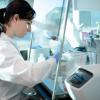UK Scientific Advisor Bamidele Farinre looks back over the set-up and decommission of the June Almeida laboratory.
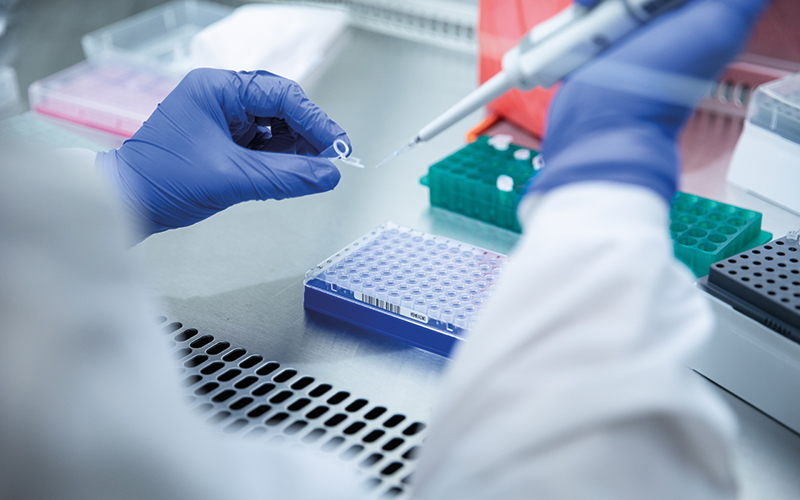
Since the start of the COVID-19 pandemic, the Department of Health and Social Care (DHSC) has vastly expanded the nation’s testing capacity, by doubling the capacity of the NHS and Public Health England (now UKHSA) laboratories, as well as setting up an entirely new nationwide network of testing sites, new Lighthouse Laboratories and partner laboratories to process COVID-19 swab samples.
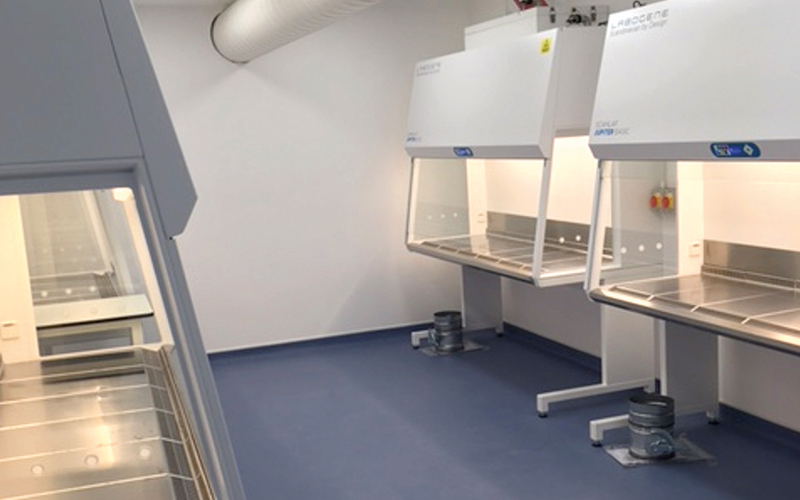
The June Almeida Laboratory (JAL) is a high-throughput facility, set up as a collaboration between King’s College London and Viapath, and provided COVID-19 Pillar 2 testing for the National Testing Programme.
Combined nose and throat swab samples from patients with suspected COVID-19 infection arrived at the JAL from regional, local, and mobile testing sites. These samples were initially received into the laboratory information management system and then inactivated using a validated heat inactivation procedure. Following heat inactivation, subsequent extraction of viral nucleic acid was performed at a containment level 2 laboratory.
The laboratory testing capacity for SARS-CoV-2 RNA is about 4500 samples per day. To facilitate the processing of such high sample throughput, nucleic acid extraction was performed using the automated Kingfisher Flex instrument in conjunction with the Thermo Fisher MagMax Viral Pathogen II extraction kit. Subsequent nucleic acid amplification was performed using the CE-marked CerTest Viasure SARS-CoV-2 detection kit and the QuantStudio Flex 7. The liquid handler “Tecan EVO 150” was also introduced to enable rapid plate processing.
This verification sought to demonstrate the performance of JAL’s end-to-end SARS-CoV-2 RNA by real-time PCR testing processes. Clinical material used in this evaluation was acquired from the Milton Keynes Lighthouse Laboratory, and thereby, results obtained using the JAL workflow were assessed against those reported by the UK Biocentre, Milton Keynes Lighthouse Laboratory.
Story behind the name June Almeida
Three members of the senior management team decided to name the lab after a female scientist. They found that June Almeida (pictured, below) was the first person to photograph a coronavirus, and she had previously worked at St Thomas’. Someone at
St Thomas’ had known her and was in contact with her daughter. They contacted her daughter, who was happy for her name to be used. Coincidentally, at the recently concluded IBMS Congress 2022 in Birmingham, I delivered a presentation on lessons learnt from the lab set-up after closure. After my talk, I was approached by a colleague who had worked directly with June Almeida. I was ecstatic and couldn’t resist having a picture taken with him (see below).
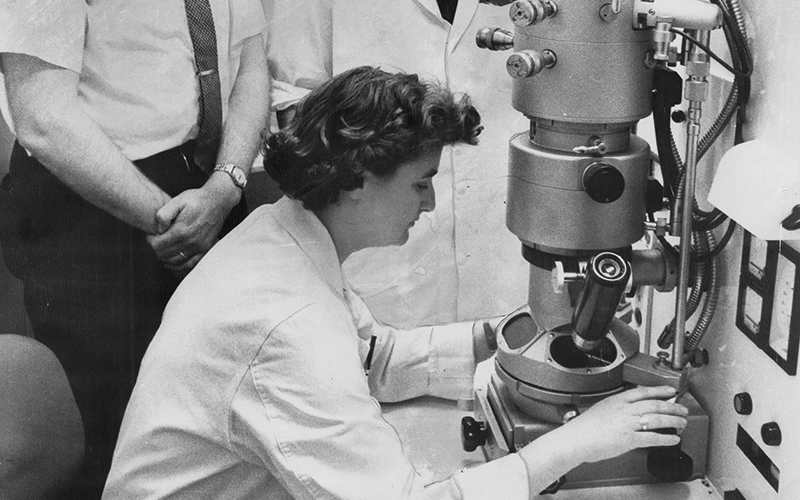
“It was decided to name the lab after a female scientist – June Almeida, the first person to photograph a coronavirus”
My role
I was employed as the Operations Lead for the project. I was involved in the day-to-day service staff issues, planning the departmental service rotas and, together with the senior biomedical scientists, ensuring the formulation and implementation of departmental policies affecting service delivery and enabling Infection Sciences to fulfil its obligations to its internal and external users with respect to turnaround times and quality control. With the support of the General Manager and the senior management team, I developed a culture in which members of staff were continuously improving the delivery of high-quality services. I was responsible for staff management and worked with the senior biomedical scientists to establish the technical function of the diagnostic laboratories and the associated responsibilities. Through leadership, motivation and systematic performance management, I was able to promote the continuous improvement in service delivery and quality within all areas, using modern methods to lead in the delivery of service and workforce transformation and re-design.
Scope
In April 2020, as the first wave of the COVID-19 pandemic took hold, King’s Health Partners chaired a weekly meeting with several key stakeholders from Viapath and across Guy’s and St Thomas’ Hospital and King’s College Hospital (KCH).
The purpose of these meetings was to share our understanding of the virus and determine how to work together to best meet the increased need for hospital-based testing (Pillar 1) as well as how to extend this to public and community testing (Pillar 2).
The DHSC put out a request for bids looking to scale-up the capacity and capability to test for COVID-19 across the capital. A joint proposal from Viapath, King’s Health Partners (KHP) and King’s College London (KCL) was submitted to the DHSC at the start of July 2020, which included several options for how we could increase our testing capacity.
DHSC confirmed in August 2020 that they would like us to increase our testing capacity by:
- Expanding the testing capacity of the current virology laboratory at KCH for Pillar 1 samples; and
- Setting up a new laboratory with testing capacity in KCL’s Franklin Wilkins Building in Waterloo to test samples received from the National Testing Programme (NTP) and KCL staff and students.
The programme was funded through a major contract with the DHSC, initially planned to end 31 March 2021 but with a framework in place to extend if needed.
Imminent closure
On 26 February 2021, the UK Government confirmed that it would decommission many of the new laboratories that had been established to deliver mass testing for COVID-19 and instead this would be centralised into several large-scale laboratories across the UK.
This meant that the JAL at Waterloo and the Surveillance Laboratory at KCH were no longer needed going forward.
June Almeida Laboratory at Waterloo The JAL had been ready to receive samples from the NTP from 8 February 2021. Following the above-mentioned confirmation, the laboratory was decommissioned and the equipment decontaminated and handed back to KCL on 10 March 2021.
Expansion of current virology laboratory at KCH
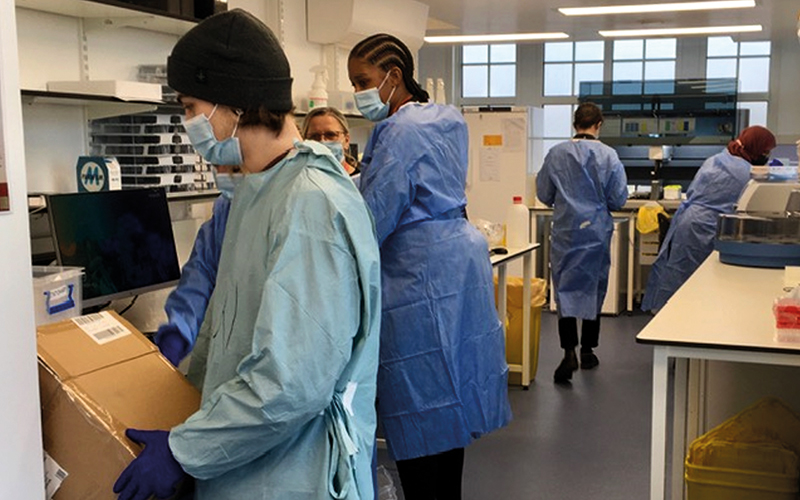
The Surveillance Lab at KCH had planned to go-live on 18 March 2021 but the space will now be utilised as required by Viapath.
Breakdown of project initiative
The objectives and scope of the June Almeida Lab Expansion Programme were to:
- Establish a new COVID-19 testing laboratory in Waterloo to support the NTP and KCL staff and student testing.
- Expand the testing capacity of the current virology laboratory at KCH by establishing a new, dedicated 24/7 COVID-19 surveillance laboratory.
- Integrate with the National Pathology Exchange (NPEx) so that the labs were able to report electronically to the NTP.
- Establish a staffing and governance framework for the new laboratories.
- Staff to be appropriately trained and have the training records to reflect this.
- The laboratories to have documented standard operating procedures and participate in the relevant EQA and IQA schemes to test/validate equipment and processes.
- Implement a resilient system, including disaster recovery solutions.
- Ensure a post-implementation review and lessons learnt are completed.
Lessons learned highlights
Things that went well
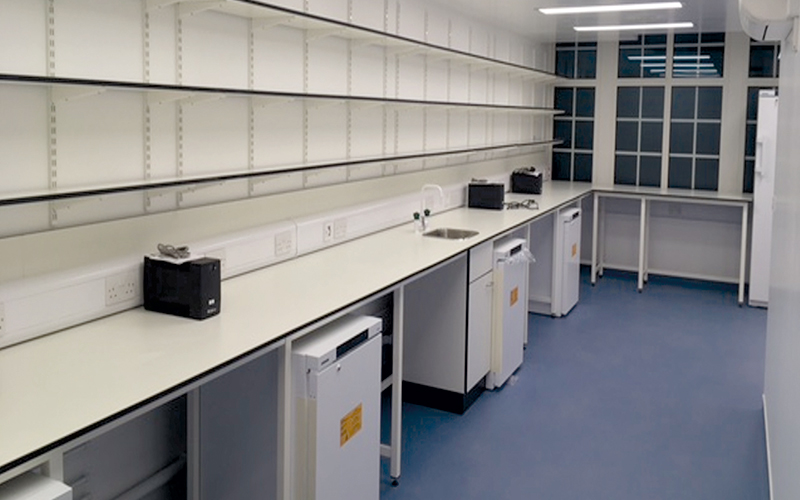
- The composition of the project team meant that the project had the necessary expertise and experience to successfully set up a new laboratory. Furthermore, it was beneficial having people on the project team who had previous experience of doing this over at Guy’s hospital at the start of the pandemic.
- The weekly meetings held with the different workstreams meant that good relationships were established across both Viapath and KCL teams and all parties were provided with an update on project progress. Furthermore, it was highlighted that the collaborative nature of the two teams meant that solutions were very quickly found and implemented.
- Clinical/academic relationships across a group of partners that hadn’t worked together before – the value witnessed of research staff engaging with health and university staff in areas of immunology, pathology, and microbiology.
Things that went less well
- From a more general procurement perspective, there are activities that we would have done differently based on what we learnt throughout this project, and these include:
- Dedicated KCL staff identified earlier to assist in procurement activities, such as quoting, placing orders and the chasing of suppliers and deliveries.
- To have detailed agreements in place with regard to pricing and deliveries, so that expectations are clear and suppliers can be held to these.
- Due to the length of the notice period of key senior staff (Ops Lead), it was not possible to bring these staff on board as quickly as we would have liked.
Therefore, it meant that key roles were only on site once decisions had been made around the layout of the laboratory and junior staff had already joined. It meant that these staff members had to pick up key aspects of their role very quickly whilst managing staff.
Bamidele Farinre is UK Scientific Advisor (Lab Validation and Quality Assurance) at the UKHSA. She would like to thank and acknowledge all the scientific team at JAL Waterloo Lab and the senior management team, Darren Costello, Robyn Schnuir, Besma Khiari, Andrea Wilson, Farooq Muhammad, Samantha Sheppard.
Image credit | iStock | Robyn Schnuir |Getty



